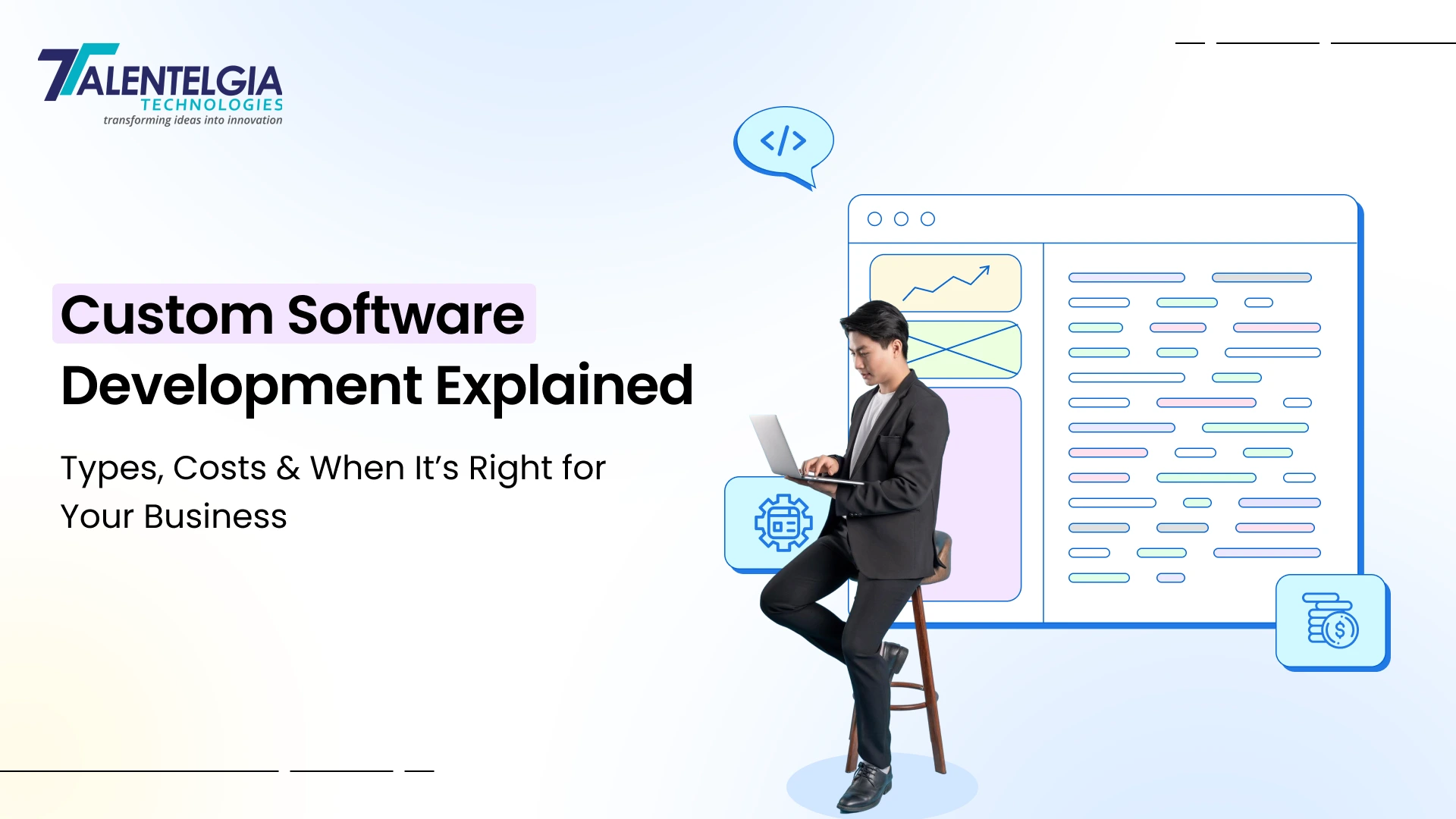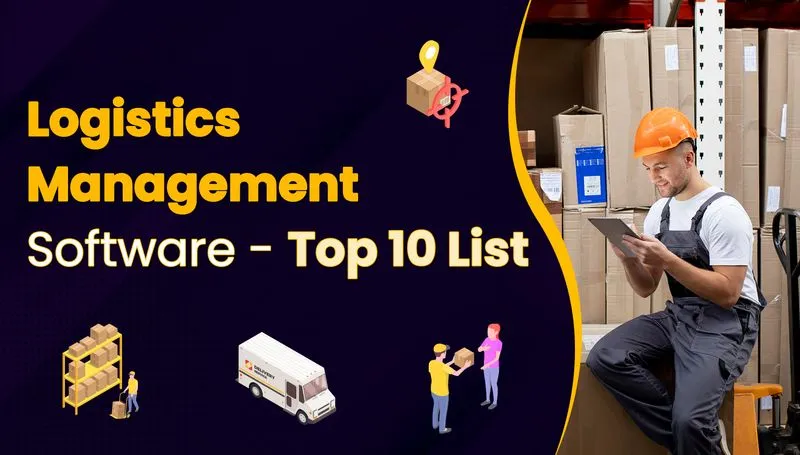In the era of modern business, where everything is rightfully being hyper-competitive, one-size-fits-all software solutions no longer suffice. Businesses, from startups to large enterprises, turn to custom software development to meet their goals and provide superior end-user experiences. But what does “custom software” actually mean? And how does it stack up against the traditional off-the-shelf options?
This guide is for you if you are a business owner, product manager, or tech enthusiast who wants to understand how custom software can offer you a competitive advantage. We’ll explain what custom software is compared to off-the-shelf software, the types you can build, and what it costs. If you’re ever considering building your first custom solution, or even just exploring options, this blog has everything you need to know before you make any decisions.
What Is Custom Software Development?
Custom software development is the process of creating unique software solutions that are specifically designed to address the individual needs of a business or organization. Unlike off-the-shelf software made for mass use, custom software is built from the ground up to support a company’s specific workflows, goals, and challenges.
This development includes everything from planning through designing to coding, deploying, and continuing to maintain the app. This results in a solution that aligns with business operations, delivering better integration and flexibility to grow and evolve in the future.
If you have software solutions that are custom-built for your business, you are ahead of the game! Industry leaders say custom software not only helps organizations go digital but also gives them a competitive advantage. Now, why are so many companies investing in custom software?
Here are several of the main reasons:
- Automate Your Workflows: With tailor-made solutions, you can bypass the tiresome cycle of manual data entry, thereby making processes more efficient.
- Cost Efficiency & Risk Reduction: Companies save unproductive costs, avoid duplication of work, and minimize the chances of errors with customized software crafted against the individual business requirement.
- Enhanced Resource Management: Custom tools provide greater visibility and control over resource allocation and consumption.
- Reliability: Automatic handling of information minimizes the scope of mistakes, thus making the data processing more robust.
Custom Software Solutions vs. Off-the-Shelf Software Solutions
When choosing between custom and off-the-shelf software, it’s essential to weigh the long-term impact on your operations, scalability, and control. Below is a breakdown of how the two compare across key parameters:
| Criteria | Custom Software | Off-the-Shelf Software |
|---|---|---|
| Customization | Tailored to specific business needs | Limited customization options |
| Cost | Higher initial investment, but potentially lower long-term costs | Lower upfront costs, potential recurring fees |
| Implementation Time | Longer development time | Quick to implement |
| Scalability | Highly scalable and adaptable | May require new software or add-ons as needs grow |
| Ownership and Control | Full ownership and control | Vendor-dependent updates and support |
| Support and Maintenance | Requires dedicated resources for ongoing maintenance | Vendor-provided support, often included |
| Time-to-Market | Slower, due to development phases | Immediately, if out-of-the-box features meet needs |
Types Of Custom Software Solutions
Custom software development covers a broad spectrum of industries and business functionalities. From automation to advanced analytics, the right tailored solution can help streamline workflows, enhance customer experience, and minimize operational inefficiencies, irrespective of whether you’re a start-up or an enterprise. Below, we highlight the most popular types of custom software that companies invest in, with a description of the top features and examples.
1. Custom Content Management Systems (CMS)
If a company needs to control and update its website content, be it blogs, pages, images, or documents, without much dependency on developers, a custom CMS development is a preferred choice. A CMS gives you complete control, from marketing teams publishing blogs to sales teams updating landing pages.
Key Features of a Custom CMS:
- Effortless content creation, editing, and publishing
- Seamless page and navigation management
- File storage and asset management in nested folders
- Workflow automation for content approval
- Custom roles and permissions for editors, authors, and admins.
Real World Example: WordPress
WordPress is the perfect example of a custom content management solution. An open-source CMS that’s highly popular and powers everything from personal sites to complex eCommerce systems.
Key Highlights:
- Best For: Business websites, online stores, personal blogs, portfolios
- Price: The core version is free; however, managed hosting starts at ₹149.00/month
WordPress is perhaps best known for its ease of use and for the sheer number of plugins available—over 58,000—allowing users to change nearly any functionality they want, without touching a line of code.
An intuitive dashboard enables content creation, user-role management, and media uploads, making it beginner-friendly but powerful enough for large-scale projects.
If you prefer a hands-off experience, managed WordPress hosting (available through providers such as Hostinger) features:
- Automatic updates and backups
- Built-in security features
- AI Tools For Troubleshooting And Content Creation
WordPress is a CMS of choice for many business owners based on its customizability, ease of use, and cost-effectiveness, with its flexibility and scalability.
2. Custom Customer Relationship Management System
A custom CRM system is developed to oversee how a business interacts with its existing customers and potential customers. Generic solutions don’t address the specific needs of your business, unlike a custom CRM, which aligns perfectly with your sales process, marketing goals, and customer engagement strategy.
Top Features of a Custom CRM:
- Centralized customer database with contact history
- Automated follow-ups and reminders
- Lead scoring, segmentation, and funnel tracking
- Email and calendar integrations (Outlook, Gmail, Yahoo, etc.)
- Sales pipeline and proposal management
Real World Example: EngageBay
If you want a freemium CRM for sales, marketing, support, and live chat, all in one platform, EngageBay is a solid candidate. Best suited for startups and small businesses, EngageBay is where you manage customer relationships and, at the same time, create email campaigns, landing pages, and automations — all without switching tools.
What Makes It Stand Out:
- Best For: Small businesses needing a unified CRM + marketing + support suite
- Free Plan: Includes 250 contacts and core features
- Paid Plans Start At: $11.99/user/month
Adding and managing contacts is easy, including customizable fields and a smart list feature that automatically updates the people in contact groups based on filters like behavior, status , or location. The drag-and-drop sales pipeline provides a visual means to follow deals, and you can create multiple pipelines—ideal if you’re running more than one sales process.
On the free plan, you have access to:
- Email marketing tools and lead scoring
- Landing pages, pop-ups, and newsletters
- Chat live widget for your website
- Automated assignment for support ticket management
The free version limits you to 250 contacts, but you can archive inactive ones so you can use it for a while longer without having to pay for an upgrade.
EngageBay is a fantastic value for brands that are just starting out or those that need a full-featured CRM without an upfront investment, with tools to grow as you expand.
3. Custom Enterprise Resource Planning (ERP) Systems
ERP systems integrate many business processes into one powerful platform—finance, inventory, supply chain, HR, compliance, and more. With a custom ERP development, the system will be configured exactly how your organization operates, removing data silos, allowing AI integration, and making for the most efficient work environment.
Top Features of a Custom ERP:
- Ongoing tracking and reporting of real-time data
- Streamlining of routine processes such as billing, invoicing, and payroll
- Management of inventory and procurement
- Tools for forecasting sales, demand, and resource planning
- Monitoring for regulatory compliance
Real World Example: Odoo
If you are looking for flexibility and scalability, Odoo is the clear winner. Odoo is a fully open-source ERP software solution, which makes it the most customizable, meaning businesses can tailor the software to match their unique operations.
What Sets Odoo Apart:
- Best For: Businesses needing a modular, fully customizable ERP system
- Free Version: Community edition available
- Paid Version: Pricing varies by modules and users
Odoo provides an all-in-one platform with pre-built apps covering a wide range of business functions, like CRM, HR, PoS, accounting, inventory, and even live chat. Whether you’re managing product deliveries, handling restaurant orders, or running a healthcare operation, Odoo likely has a ready-to-deploy solution. And if it doesn’t? You can build or customize one thanks to its open-source architecture.
4. Operations Management Software
This type of custom software assists businesses in managing production workflows, inventory, quality control, and much more. It is particularly valuable in logistics-heavy or manufacturing-based industries where precision and speed are vital.
Key Features of Operations Management Software:
- Centralized dashboard for planning and tracking workflows
- Predictive analytics for demand and supply fluctuations
- Inventory and warehouse automation
- Quality assurance tracking and issue detection
- Risk and delay management with alert systems
Real Life Example: Zoho Creator
Looking for a simple way to create custom business apps without heavy coding? Zoho Creator is a powerful low-code platform that empowers businesses to automate processes, build custom database-driven applications, and streamline operations—without needing a full development team.
What is Zoho Creator Best For?
- Ideal For: Startups, SMEs, and agencies looking to build apps quickly
- Use Case: Data collection, process automation, and cross-team collaboration
- Platform Type: Web + Mobile
With Zoho Creator, you can design highly functional apps using drag-and-drop tools, set up workflows, and automate daily business tasks like scheduling, permissions, and reporting. It’s equipped to handle everything from CSV and Excel imports to real-time updates and built-in mobile features like barcodes, maps, and camera integration.
Zoho Creator Pricing Overview
- Free Trial: Yes
- Professional Plan: $25/user/month
- Enterprise Plan: $400/month (includes unlimited apps and 10 users)
- Additional Users: $25/month per user
Cost Of Custom Software Development
The cost of custom software development will depend on several factors, like the complexity of the project, the different features, and the scale of the project. In practice, the cost for most of the real-life projects ranges from $100 to $400k+.
Here’s a rundown to help you know what to expect:
| Application Type | Description | Projected Price Range |
|---|---|---|
| Small Applications | Simple features, few integrations | $100,000 – $200,000 |
| Supported Medium Solutions | Multi-platform, dashboards, medium complexity | $200,000 – $400,000 |
| Large / Enterprise-Grade Applications | Heavy data processing, multiple user roles, integrations, custom logic | $400,000 and up |
- Platform
The platform your solution will run on is one of the most impactful factors affecting custom software development costs. The ecosystem you choose will directly influence the project’s complexity—and that means the budget—as you build for Android, iOS, web, desktop, or cross-platform solutions.
Take Android, for example. It is a commanding platform not only for smartphones, but also for smart TVs, wearables, tablets, streaming devices, and even IoT appliances. However, this huge reach also brings about the need for higher scalability and a much deeper technical architecture, which enhances development efforts and costs.
If your software has to work on multiple platforms (Android, iOS, web, etc.), you’ll probably be looking for separate native development teams, each focused on different ecosystems. This increases the demand for resources and, therefore, the cost of the project beyond that of building for a single platform.
Moreover, the technology stack you opt for—whether it’s Flutter, React Native, Kotlin, or Swift—will affect your time-to-market and development costs. The majority of cross-platform tools have the potential to save costs but might require some compromises on performance and customization.
- Minimum Viable Product
Creating a fully functional application without validating the market is quite risky, and that’s where a Minimum Viable Product (MVP) comes into play! An MVP is a stripped-down version of your software with the minimum number of features needed to meet the basic needs of early users and collect actionable feedback.
Suppose we’re planning to create a music streaming app where users can schedule songs to be played at certain times. It’s an exciting notion, but diving straight into full development could be expensive. Instead, by rolling out an MVP, you get to assess how users respond to this feature before investing significant resources.
However, on average, developing an MVP might take 20% to 40% of your total software development budget and gives a high ROI. You get a lot of insights about real user behavior, catch usability problems early, and avoid building features no one cares about.
Best of all, MVP development allows your team more time for the complex core features, to perfect a product roadmap, and launch into the market quicker with a tried-and-tested solution.
- Size Of The Company
The scale of your business will largely impact the overall cost of custom software development. Fast-moving startups to well-established enterprises — each company category has different requirements, development timeline, and compliance needs, which eventually show in pricing.
| Type | Focus | Key Needs | Cost | Hours | Hourly Rate |
|---|---|---|---|---|---|
| Enterprise | Large-scale, high-security systems | Compliance, integrations, data security | $200K+ | 4000+ | $30–$50+ |
| SMEs | Tools like CRMs, dashboards, portals | Simpler architecture, moderate customization | $100K+ | ~2000 | $25–$45 |
| Startup | MVPs, lean launches | Fast deployment, cost-efficient tech stack | Budget-friendly | 500–1500 | $20–$40 |
- UX/UI Design
The importance of UI/UX in our software lies in the fact that it forms an essential element in the successful operation of any application. A slick, intuitive design adds to the product’s marketability and user adoption. But more detailed designs need more resources and may raise the project cost.
| Design Complexity | Estimated Cost |
|---|---|
| Basic Project | $100,000 |
| Average Project | $150,000 |
| Complex Project | $220,000 |
Why Your Business Needs a Custom Software Solution?
In this era of digital transformation, it is quite common that not all businesses work on off-the-shelf solutions. As your company starts to scale, innovate, or simply faces challenges with process, you might notice gaps in your existing tools. That’s where custom software development comes into play.
But how do you tell if it’s a good move? If any of the following symptoms seem to best describe your current business situation, it may be time to invest in a custom software solution.
1. Employees Struggling with Inefficient Processes and Workarounds
Are you and your team bogged down by continual manual tasks and ineffective workarounds? Then it sounds like you need custom software solutions. Many processes are too involved or encode unnecessary steps and waste precious time.
Signs of Things That Lead to Inefficient Processes:
- Your Processes Are Tedious: Indulgent paperwork, activities that demand excessive time, or scores of red tape indicate that you can see through your business processes. Technology is supposed to automate these tasks and make them easier, not more painful.
- Workarounds: When your team has to do things manually, such as exporting data from one software to import into another, or adjusting reports manually, your current software isn’t working for you anymore.
Tip of the Day: A well-run, organized work environment can increase employee productivity. Custom software may make work simpler, less cumbersome, and cost-effective, resulting in satisfied workers without the need to raise salaries for more effectiveness and morale.
2. Spending Too Much Time Manipulating Data in Spreadsheets
Small businesses end up investing too much time working with financial, customer, and sales data in spreadsheets. Not only does this process take up time, but it is also error-prone.
Because custom software can automatically integrate this exacting detail in your reporting, your team would have immediate access to this intelligence and actionable insights. Custom software can connect directly with your data sources, such as point-of-sale systems, and from there, you can create reports and charts with the click of a button, giving you more time to make strategic decisions.
3. Your Sales Team and Remote Employees Need Secure Access to Data
If your salespeople, remote workers, or on-the-ground team need secure access to proprietary company data, using insecure platforms such as Slack or email puts your data at risk. Custom software provides more secure access, limited to the information they need, and encrypts business credentials.
Not only does this put sensitive data at risk, but you also build an interprocess network platform that can serve you encrypted and watertight your project, because the software you need to use is yours. This can help protect your business from data breaches and unauthorized access.
Tip: If your organization employs remote workers, ensure your telecommuting policy incorporates protocols for remote tools, access, and communication.
4. Your Business Has Unique, Proprietary Processes
If your company operates in an emerging industry or has developed proprietary products or services, off-the-shelf software might not cut it. Custom software allows you to build a solution tailored specifically to your unique processes and requirements.
For instance, platforms like Uber had to create their own custom software to facilitate ride-sharing, a business model that didn’t exist before. If your business is doing something innovative, a custom solution could help you stay ahead.
5. Your Company Is Growing
When your business grows, it becomes essential to put systems that can grow with you. Easy scalability is an advantage of custom software over off-the-shelf solutions. Having a customized solution means you don’t have to deal with the constraints of generic software when adding new users, sites, and features.
Building your software can also lead to customer loyalty, reduced error margin, and improved customer satisfaction—all of which are key to your company’s speedy and smooth growth process.
Conclusion
Custom software development is not merely a technological trend. It is a long-lasting business strategy. From automating workflows to launching scalable digital products, these custom solutions help businesses overcome unique challenges that off-the-shelf tools just can’t touch. By opting for custom software, you gain complete control over the features, performance, and security you need, allowing you to tailor solutions to your exact requirements.
At Talentelgia, we specialize in turning bold ideas into powerful software solutions. Our expert team works closely with you to understand your business goals, design user-centric interfaces, and build secure, scalable products that align with your vision. Whether you're a startup or an enterprise, we’re here to help you develop custom software that drives real results in 2025 and beyond.


 Healthcare App Development Services
Healthcare App Development Services
 Real Estate Web Development Services
Real Estate Web Development Services
 E-Commerce App Development Services
E-Commerce App Development Services E-Commerce Web Development Services
E-Commerce Web Development Services Blockchain E-commerce Development Company
Blockchain E-commerce Development Company
 Fintech App Development Services
Fintech App Development Services Fintech Web Development
Fintech Web Development Blockchain Fintech Development Company
Blockchain Fintech Development Company
 E-Learning App Development Services
E-Learning App Development Services
 Restaurant App Development Company
Restaurant App Development Company
 Mobile Game Development Company
Mobile Game Development Company
 Travel App Development Company
Travel App Development Company
 Automotive Web Design
Automotive Web Design
 AI Traffic Management System
AI Traffic Management System
 AI Inventory Management Software
AI Inventory Management Software
 AI Software Development
AI Software Development  AI Development Company
AI Development Company  AI App Development Services
AI App Development Services  ChatGPT integration services
ChatGPT integration services  AI Integration Services
AI Integration Services  Generative AI Development Services
Generative AI Development Services  Natural Language Processing Company
Natural Language Processing Company Machine Learning Development
Machine Learning Development  Machine learning consulting services
Machine learning consulting services  Blockchain Development
Blockchain Development  Blockchain Software Development
Blockchain Software Development  Smart Contract Development Company
Smart Contract Development Company  NFT Marketplace Development Services
NFT Marketplace Development Services  Asset Tokenization Company
Asset Tokenization Company DeFi Wallet Development Company
DeFi Wallet Development Company Mobile App Development
Mobile App Development  IOS App Development
IOS App Development  Android App Development
Android App Development  Cross-Platform App Development
Cross-Platform App Development  Augmented Reality (AR) App Development
Augmented Reality (AR) App Development  Virtual Reality (VR) App Development
Virtual Reality (VR) App Development  Web App Development
Web App Development  SaaS App Development
SaaS App Development Flutter
Flutter  React Native
React Native  Swift (IOS)
Swift (IOS)  Kotlin (Android)
Kotlin (Android)  Mean Stack Development
Mean Stack Development  AngularJS Development
AngularJS Development  MongoDB Development
MongoDB Development  Nodejs Development
Nodejs Development  Database Development
Database Development Ruby on Rails Development
Ruby on Rails Development Expressjs Development
Expressjs Development  Full Stack Development
Full Stack Development  Web Development Services
Web Development Services  Laravel Development
Laravel Development  LAMP Development
LAMP Development  Custom PHP Development
Custom PHP Development  .Net Development
.Net Development  User Experience Design Services
User Experience Design Services  User Interface Design Services
User Interface Design Services  Automated Testing
Automated Testing  Manual Testing
Manual Testing  Digital Marketing Services
Digital Marketing Services 
 Ride-Sharing And Taxi Services
Ride-Sharing And Taxi Services Food Delivery Services
Food Delivery Services Grocery Delivery Services
Grocery Delivery Services Transportation And Logistics
Transportation And Logistics Car Wash App
Car Wash App Home Services App
Home Services App ERP Development Services
ERP Development Services CMS Development Services
CMS Development Services LMS Development
LMS Development CRM Development
CRM Development DevOps Development Services
DevOps Development Services AI Business Solutions
AI Business Solutions AI Cloud Solutions
AI Cloud Solutions AI Chatbot Development
AI Chatbot Development API Development
API Development Blockchain Product Development
Blockchain Product Development Cryptocurrency Wallet Development
Cryptocurrency Wallet Development About Talentelgia
About Talentelgia  Our Team
Our Team  Our Culture
Our Culture 
 Healthcare App Development Services
Healthcare App Development Services Real Estate Web Development Services
Real Estate Web Development Services E-Commerce App Development Services
E-Commerce App Development Services E-Commerce Web Development Services
E-Commerce Web Development Services Blockchain E-commerce
Development Company
Blockchain E-commerce
Development Company Fintech App Development Services
Fintech App Development Services Finance Web Development
Finance Web Development Blockchain Fintech
Development Company
Blockchain Fintech
Development Company E-Learning App Development Services
E-Learning App Development Services Restaurant App Development Company
Restaurant App Development Company Mobile Game Development Company
Mobile Game Development Company Travel App Development Company
Travel App Development Company Automotive Web Design
Automotive Web Design AI Traffic Management System
AI Traffic Management System AI Inventory Management Software
AI Inventory Management Software AI Software Development
AI Software Development AI Development Company
AI Development Company ChatGPT integration services
ChatGPT integration services AI Integration Services
AI Integration Services Machine Learning Development
Machine Learning Development Machine learning consulting services
Machine learning consulting services Blockchain Development
Blockchain Development Blockchain Software Development
Blockchain Software Development Smart contract development company
Smart contract development company NFT marketplace development services
NFT marketplace development services IOS App Development
IOS App Development Android App Development
Android App Development Cross-Platform App Development
Cross-Platform App Development Augmented Reality (AR) App
Development
Augmented Reality (AR) App
Development Virtual Reality (VR) App Development
Virtual Reality (VR) App Development Web App Development
Web App Development Flutter
Flutter React
Native
React
Native Swift
(IOS)
Swift
(IOS) Kotlin (Android)
Kotlin (Android) MEAN Stack Development
MEAN Stack Development AngularJS Development
AngularJS Development MongoDB Development
MongoDB Development Nodejs Development
Nodejs Development Database development services
Database development services Ruby on Rails Development services
Ruby on Rails Development services Expressjs Development
Expressjs Development Full Stack Development
Full Stack Development Web Development Services
Web Development Services Laravel Development
Laravel Development LAMP
Development
LAMP
Development Custom PHP Development
Custom PHP Development User Experience Design Services
User Experience Design Services User Interface Design Services
User Interface Design Services Automated Testing
Automated Testing Manual
Testing
Manual
Testing About Talentelgia
About Talentelgia Our Team
Our Team Our Culture
Our Culture

















 Write us on:
Write us on:  Business queries:
Business queries:  HR:
HR: 




